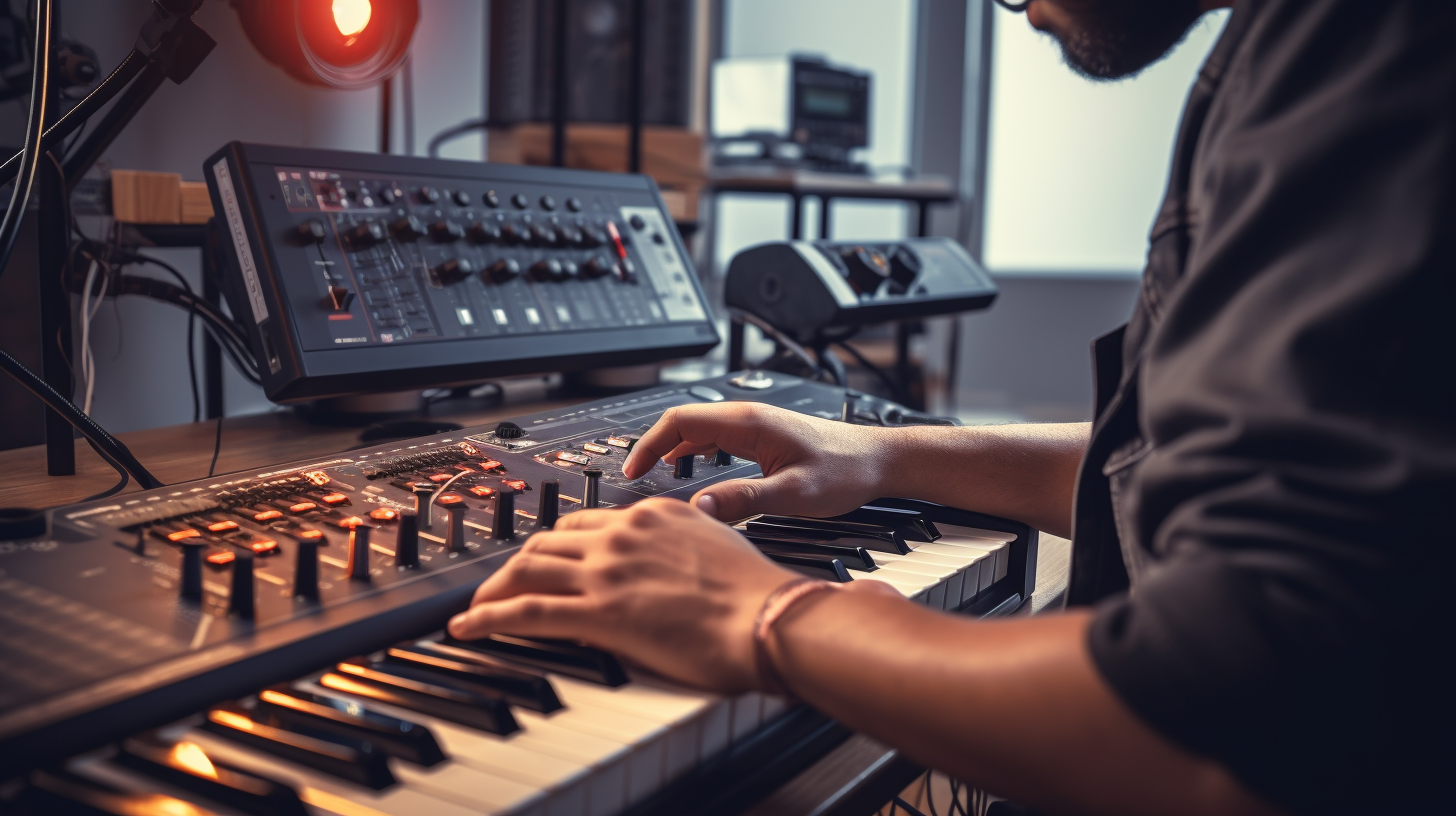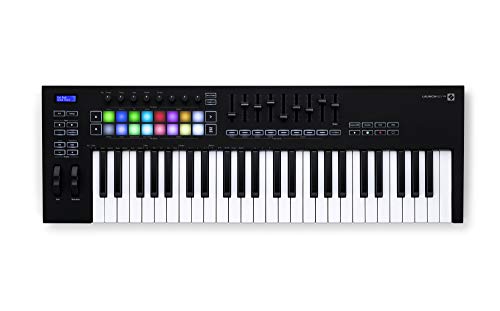The 12 Best MIDI Controllers of 2024: Beginner to Professional
Midi controllers have made music production possible for the masses. It brings studio production capabilities into your home.
Looking for the best MIDI controller to enhance your music production? Whether you're a beginner or a professional, the right MIDI controller can significantly elevate your creativity and workflow. From compact, budget-friendly options to full-sized, professional-grade controllers, our guide to the best MIDI controllers of 2024 has something to meet every need.
We include top-rated MIDI controllers that offer seamless DAW integration, velocity-sensitive pads, weighted keys, and more. If you're seeking a portable solution or a feature-rich MIDI keyboard controller, we have that, too.
Whether it's for home studios or live performances, our comprehensive list will assist you in finding the perfect MIDI controller tailored to your specific requirements. Dive into our in-depth analysis below and make an informed decision today!
1. Novation Launchpad Pro
Pros:
Seamless integration with Ableton Live,
64 RGB pads
Customizable layouts
Cons:
Limited functionality outside of Ableton might be overwhelming for beginners.
Summary:
The Novation Launchpad Pro is a robust and versatile tool that stands as one of the best grid controllers designed specifically for Ableton Live. The 64 RGB backlit pads are velocity- and pressure-sensitive, allowing for expressive performances and intricate control over clips and tracks.
The customizable layouts and dedicated controls for Ableton's key features offer an intuitive, hands-on experience that can greatly enhance workflow. Novation's added MIDI I/O and standalone mode broaden the utility beyond just Ableton, though it's clear the Launchpad Pro shines brightest when paired with this particular DAW. Despite its strong focus on Ableton, it's still compatible with other major DAWs, though it might not be as fully functional.
While it may be somewhat overwhelming for beginners, its build quality and extensive capabilities make it an essential tool for studio work and live performances. The Novation Launchpad Pro offers unmatched control and integration for professional producers and performers who rely on Ableton Live.
2. Akai Professional MPK Mini MK4
Pros:
Compact
Budget-friendly
Versatile
Cons:
Limited controls
Not suitable for professional use
Summary:
The Akai MPK Mini MK4 is the perfect entry-level controller for budding musicians.
Its compact design includes 25 synth-action mini keys, eight backlit pads, and eight control knobs, offering flexibility in a small package. The inclusion of a joystick for pitch and modulation adds a playful touch. Its bundled software helps beginners start producing quickly, while its affordable price tag makes it accessible. However, its limited controls might hinder more complex music production, and professionals may find it lacking. Overall, it's a fantastic option for hobbyists and those starting in music production.
3. Native Instruments Maschine MK3
Pros:
Integrated software
A large number of pads.
Cons:
The software can be complex
Expensive
Summary:
Native Instruments Maschine MK4 is a dynamic controller for serious music producers. The 16 ultra-sensitive pads and high-resolution color screens allow for deep experimentation with rhythms and samples. A broad selection of effects and instruments further opens up the possibilities.
Integration with Maschine software gives you an almost limitless production environment, though the complexity of this software might be daunting to some users. The build quality and aesthetics are premium, but its higher price and steep learning curve could be considered drawbacks for novices.
This controller is designed for those who desire a comprehensive production experience.
4. Novation Launchkey 49 MK3
Pros:
Easy integration with major DAWs,
49 full-size keys.
Cons:
Bulkier
Lacks advanced features
Summary:
Novation’s Launchkey 49 MK3 is a versatile and user-friendly MIDI controller. The 49 full-size keys, 16 velocity-sensitive RGB pads, nine faders, and eight rotary knobs provide a comprehensive interface for various musical styles. Its seamless integration with popular DAWs, such as Ableton Live, Logic Pro, and FL Studio, makes it an attractive option for many musicians.
While its size may not be suitable for portable setups, its functionality shines in studio environments. Though it lacks some advanced features in professional-grade controllers, its balance of price and features makes it a great all-rounder.
5. Arturia KeyLab Essential 61
Pros:
Excellent key feel
Bundled software
Cons:
Limited pad sensitivity
Larger footprint
Summary:
Arturia's KeyLab Essential 61 stands out for its superb playing experience. The 61 velocity-sensitive keys, eight performance pads, and an array of rotary encoders provide tactile control over your DAW. The included Analog Lab software adds significant value with its extensive collection of vintage synthesizers and keyboard sounds.
Although some users might find the pad sensitivity lacking, the overall build quality and design are appealing. Its larger size might not suit every studio setup, but it's an excellent choice for keyboard players looking for a blend of classic and modern.
6. Roland A-88MKII
Cons:
Expensive
Fewer pads and knobs
Pros:
Professional-grade keys
Sleek design
Summary:
The Roland A-88MKII is tailored for professional pianists and those seeking an authentic piano feel. Its 88 fully-weighted keys with Ivory Feel provide a luxurious playing experience. The three customizable zones allow for layered or split sounds, making it adaptable to different performance scenarios.
Although the controller lacks additional control options like pads and rotary knobs, the key action is truly unparalleled in this price range. Its focus on key quality might be limiting for those needing a multi-functional controller, but for those who prioritize the piano-playing experience, the A-88MKII is worth the investment.
7. Yamaha MX49
Pros:
Integrated synthesizer
Intuitive controls
Cons:
Bulky
Less suitable for pure MIDI control
Summary:
The Yamaha MX49 serves as both a MIDI controller and a standalone synthesizer. With 49 velocity-sensitive keys, over 1000 sounds from the Motif series, and versatile controls, it provides a comprehensive package for performers and producers. Its VCM effects enhance sound shaping, and the included Cubase AI provides a seamless production workflow.
The bulkier design may be less suitable for those only seeking MIDI control, and the complexity of the built-in synthesizer might be overwhelming for some. But for those looking for an all-in-one instrument, the MX49 is an attractive option.
8. M-Audio Oxygen Pro 49
Pros:
Affordable
Feature-packed
Cons:
Build quality may lack
Limited software integration
Summary:
M-Audio's Oxygen Pro 49 offers an impressive set of features at a budget-friendly price. With 49 full-size keys, 16 RGB-backlit performance pads, and nine faders, it offers a broad range of controls for creative exploration. The Auto-Mapping function simplifies DAW integration, but compatibility may vary.
Although some users might find the build quality lacking compared to premium options, the features provided offer substantial value. Its included software bundle adds to its appeal for beginners and intermediate users. A versatile and accessible option for those conscious of price without sacrificing essential features.
9. Nektar Impact LX88+
Pros:
88 keys
Excellent DAW integration
Cons:
Slightly heavier
Less portable
Summary:
Nektar’s Impact LX88+ is a dream for studio musicians looking for a full keyboard experience. The 88 semi-weighted keys and nine faders provide extensive control, and the DAW integration makes workflow smooth and efficient. Its included Bitwig 8-Track software is a welcome addition for those starting a home studio.
Though its size and weight make it less portable, the controls and key feel make it a joy to use in a stationary setup. A unique split function and other customizable features offer creative flexibility, positioning it as an excellent option for more serious home studio producers.
10. Behringer Motor 61
Pros:
Motorized faders
Solid build
Cons:
Fewer pads
Software compatibility issues
Summary:
The Behringer Motor 61 has nine motorized touch-sensitive faders, providing real-time visual feedback. Its 61 semi-weighted keys, eight backlit pads, and eight encoders offer a well-rounded control surface. However, the limited number of pads and potential software compatibility issues may hinder some users.
It’s durable build, and unique faders are attractive for those seeking physical control over mix parameters. A fine-tuned selection of bundled software adds value, making it suitable for intermediate to advanced users seeking tactile feedback from their DAW.
11. KORG microKEY Air 37
Pros:
Ultra-portable
Wireless connectivity
Cons:
Limited controls
Small key size
Summary:
The KORG microKEY Air 37 excels in portability. It is designed for musicians on the move and offers wireless connectivity and a slim design that fits most bags. The 37 mini keys and limited controls might not suit every user. Still, its compatibility with iOS devices and seamless integration with KORG Gadget makes it ideal for on-the-go creation.
The battery-powered option and robust build quality add to its mobility. While it may not be suitable for complex studio work, its niche in mobile music production is hard to beat, making it a perfect companion for traveling musicians.
12. Alesis V49 MKII
Pros:
49 Full Size Keys
Very affordable so a great entry-level Midi
Cons:
Not many custom buttons and knobs
Limited availability in stores
Summary:
The Alesis V49 MKII midi controller gets a lot of love from the entry-level standpoint and has been the beginning of many careers. The reason it gets so much attention is that it is such good value, well made, and offers 49 full-sized keys where competitors often make everything a little smaller. Of course, for the price, they had to cut some of the controls you get on more expensive models, but the Alesis is still a great way to get into the game.
Conclusion
Selecting the right MIDI controller requires a careful assessment of your specific needs, budget, and workflow preferences. With options catering to beginners, professionals, keyboard enthusiasts, and mobile musicians, this comprehensive list of the 11 best MIDI controllers of 2024 offers something for everyone. Consider what’s most important to you – integration with your preferred DAW, key or pad count, overall build quality, and size – to find the perfect match for your musical journey.
FAQ: Frequently Asked Questions About MIDI Controllers
What is a MIDI Controller, and How Does it Work?
A MIDI (Musical Instrument Digital Interface) controller is a device that sends MIDI data to other hardware or software, such as VST technology software, capable of interpreting it. It doesn't produce sound by itself but triggers sounds within synthesizers, computers, or other MIDI-enabled devices. The data may represent musical notes, velocity, or control changes, allowing musicians to compose, perform, and manipulate music digitally.
Can I Use a MIDI Controller with Any DAW (Digital Audio Workstation)?
Most modern MIDI controllers are compatible with popular DAWs like Ableton Live, Logic Pro, FL Studio, and Cubase. However, some controllers are designed to integrate more seamlessly with specific DAWs, offering enhanced functionality. Always check the controller's specifications to ensure compatibility with your preferred DAW.
Do I Need Special Software to Use a MIDI Controller?
While you don't necessarily need special software to connect a MIDI controller, using it with music production software like DAWs or virtual instruments will unlock its full potential. Many controllers come bundled with software to help you get started, and they can generally interface with a wide range of music software.
Is a More Expensive MIDI Controller Always Better?
Not necessarily. Again, AudiophileOn discusses in the article “What is a MIDI Controller and how it changed Music Forever” that the best MIDI controller for you depends on your needs, budget, and experience level. Professional-grade controllers with more features and higher build quality typically cost more, but entry-level controllers can be suitable for beginners or those with budget constraints. Carefully consider your requirements and choose a controller that meets them without unnecessary extras.
Can MIDI Controllers Be Used for Live Performances?
Yes, many MIDI controllers are designed to be used both in the studio and for live performances. Features like velocity-sensitive pads, customizable layouts, and seamless software integration can enhance live performances. Some models are built with portability and durability in mind, making them well-suited for taking on the road. Always consider your specific needs when selecting a MIDI controller for live use.












